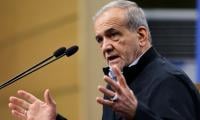Shahbaz Taseer’s kidnapping in August 2011 and recovery about four and a half years later on March 8 provide us with a few insights that are worth recalling.
First, there is the disturbing fact that Pakistan’s intelligence agencies, including the premier one with a reputation for accomplishing tough missions, were unable to gain access to the Uzbek kidnappers and their accomplices. This meant the spy networks couldn’t play any role in the recovery of Shahbaz Taseer.
This raises questions of whether the recovery of well-known people kidnapped in the past was made possible due to an ‘intelligence-based operation’ or a ‘deal’ based on payment of ransom and release of militants. Besides, the rush by government officials and departments to claim undue credit for recovering Shahbaz Taseer only led to further questions about previous such claims.
There is no doubt that our intelligence agencies have generally performed well and foiled terrorist attacks, but they have also had their fair share of failure. In Shahbaz Taseer’s case, the kidnapping took place in broad daylight in a relatively secure city, Lahore. He was kept there for a few days and then driven in Punjab and Khyber Pakhtunkhwa all the way to North Waziristan without being detected. For three years, Shahbaz Taseer was held hostage in Danday Darpakhel village located so close to Miramshah, the civil and military headquarters, but was still beyond the reach of the Pakistan Army, Frontier Corps and Khassadar force.
On the eve of the Zarb-e-Azb military operation launched on June 15, 2014, he was shifted to the mountainous and forested Shawal valley, but this too has always been a part of Pakistan and should never have become an inaccessible place with no writ of the state. Hopefully, the ongoing military action should establish a semblance of state authority in Shawal, though constant attention would be needed to retain its control due to the ease with which it can be infiltrated by Afghanistan-based militants.
The government’s inability to help prompted Shahbaz’s worried family to take the matter into their own hands and establish contact with the kidnappers through private individuals, mostly tribesmen from North Waziristan and also Afghans with ties to the militants. This channel proved useful as the Uzbeks, affiliated with the Islamic Movement of Uzbekistan (IMU), began communicating with the family – primarily with Shahbaz Taseer’s father-in-law Suleman Ghani, a senior civil servant who had retired as a federal secretary.
Second, the on-again, off-again contacts with the kidnappers showed how the IMU built alliances and attracted both Afghans and Pakistanis to its fold. This helped it to gain local support and build sanctuaries. A Pakistani Pakhtun who introduced himself as Mohammad and a Pakistani Punjabi who gave his name as Sharif became involved in the telephonic negotiations in late 2014-2015 for a possible deal with Shahbaz Taseer’s family. Both spoke Urdu but their accents betrayed their ethnicity.
Danyal Aqa, the IMU intelligence head who remained in touch with Shahbaz Taseer’s family and the mediators until he was killed in a US drone strike in North Waziristan, had married the daughter of a local cleric and thus become a son-in-law deserving the family’s support.
The kidnapping too was a joint operation. An Uzbek, Mohammad Ali, and his brother were involved, along with accomplices from a Punjab-based sectarian militant group including Usman Basra, Farhaj Butt, Hafiz Waqas and Rana Abdur Rahman. The last-named was bailed out and is reportedly living in a Gulf country while the other three are in jail. The kidnappers wanted them freed at any cost and they were listed among the 22 men who had to be released in exchange for Shahbaz Taseer. The list was later cut down to 10-13 and the names of Mumtaz Qadri and others were excluded in a bid to make it palatable for the government.
Third, the terror unleashed by the IMU made it a feared outfit. It became indispensable to militant groups such as the TTP by offering fighters to take part in terrorist attacks. Neither the TTP chief Hakimullah Mehsud and his deputy Waliur Rahman nor Al-Qaeda and the North Waziristani militant commander Hafiz Gul Bahadur could reproach the IMU. The IMU erred by offending the Afghan Taliban in the latter’s stronghold of Zabul province in Afghanistan and had to pay a heavy price.
Fourth, we should see the kind of impact made by Operation Zarb-e-Azb on the local and foreign militants – losing sanctuaries in North Waziristan and earlier in South Waziristan due to the military operation in 2009. They lost towns and territory they had used to organise terrorist attacks all over Pakistan, attract recruits and run their kidnapping and extortion rings. Most of the militants escaped to Afghanistan before Zarb-e-Azb, but their capacity to strike back was diminished.
Fifth, the military capability of the Afghan Taliban movement despite the split in its ranks came as a surprise because it managed to vanquish rivals such as the IMU and its ally, dissident Taliban commander Mansoor Dadullah, in Zabul. It is also battling the Islamic State or Daesh while continuing its military campaign against the Afghan and the residual US-led Nato forces. The IMU’s defeat came as a blessing in disguise for Shahbaz Taseer as he won freedom from the Uzbeks. He was eventually freed by his new captors, the Afghan Taliban, who investigated and found that he wasn’t an Uzbek but was the son of the slain Punjab governor Salmaan Taseer.
They could have obliged the Pakistan government by handing over Shahbaz Taseer to it, but for unexplained reasons they didn’t do so. Instead, they gave him Rs15,000 for the journey to Pakistan and guided him to a group of Taliban who were planning to cross the border on motorcycles. Through his presence of mind, Shahbaz Taseer told these unfamiliar people that he was a British citizen named Yousaf. They dropped him at Kuchlak because they didn’t want to go to Quetta and risk getting caught.
Lastly, it goes without saying that Shahbaz Taseer was lucky to survive the ordeal and return home safely without any deal being struck with the kidnappers. He also bravely faced torture, which included pulling out his nails and sending them to his family. And soon after becoming a free man, he shaved his unkempt beard and changed his clothes to show how he wants to spend his life.
The writer is resident editor of The News in Peshawar.
Email: rahimyusufzai@yahoo.com
Beijing was among first to denounce the tariffs, calling them “unjustifiable” and vowing strong countermeasures
With this unprecedented buildup, Diego Garcia has transformed into ticking time bomb of apocalyptic power
Pakistan is among world’s most climate-vulnerable nations, despite contributing minimally to global emissions
‘Azazeel’ is perhaps the most controversial novel to come out in Egypt this century
Dr Haroon Ahmed was an exceptional person, a precious human being who strived, throughout his long life
Pakistan can't afford another status quo budget so it must be budget of imagination, risk-taking and system-level...







